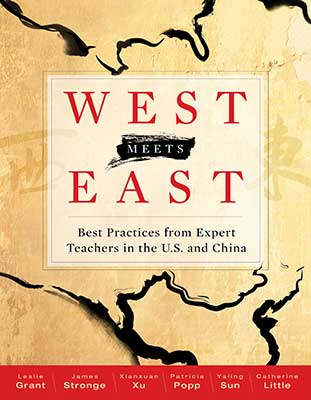West Meets East
 As cultural comparisons among educational systems have taken front and center stage in the media and educational research a fundamental question asked is what distinguishes educational systems in various countries. In particular, researchers at The College of William and Mary, Yunnan Normal University in Kunming, China, and the University Connecticut have studied the similarities and differences in the beliefs and practices of award-winning teachers in the United States and China. The United States and China—two nations that are drastically different in demographics, history, political systems, and socioeconomic status—also differ dramatically in teaching systems and instructional practices. With that in mind, the team of researchers set out to answer a few questions, not least of which were: Which beliefs and practices of effective teachers cross the cultural divide? Which are unique to each culture? This study resulted in the publication of West Meets East: Best Practices of Expert Teachers in the U.S. and China published in May 2014 by the Association for Supervision and Curriculum Development (ASCD). The book was chosen as a featured selection for the ASCD member books.
As cultural comparisons among educational systems have taken front and center stage in the media and educational research a fundamental question asked is what distinguishes educational systems in various countries. In particular, researchers at The College of William and Mary, Yunnan Normal University in Kunming, China, and the University Connecticut have studied the similarities and differences in the beliefs and practices of award-winning teachers in the United States and China. The United States and China—two nations that are drastically different in demographics, history, political systems, and socioeconomic status—also differ dramatically in teaching systems and instructional practices. With that in mind, the team of researchers set out to answer a few questions, not least of which were: Which beliefs and practices of effective teachers cross the cultural divide? Which are unique to each culture? This study resulted in the publication of West Meets East: Best Practices of Expert Teachers in the U.S. and China published in May 2014 by the Association for Supervision and Curriculum Development (ASCD). The book was chosen as a featured selection for the ASCD member books.
This study began as a collaboration among coauthors Leslie W. Grant, Ph.D. ’06, Assistant Professor of Educational Leadership at William and Mary, James H. Stronge, Ph.D. Heritage Professor of Educational Leadership also of William and Mary, and Catherine A. Little, Ph.D. ’01, Associate Professor at the University of Connecticut focusing on award-winning teachers in the United States. Patricia A. Popp, Ph.D. ’01, Director of Project HOPE at William and Mary joined the study later and brought with her a focus on award-winning teachers in the United States who work with at-risk and highly mobile students. The team had the great fortune to work with Yaling Sun, Ph.D., a visiting scholar from China and Professor at Yunnan Normal University in Kunming, China. Through a common interest in what constitutes teacher effectiveness, we launched a cross-cultural study of the beliefs and practices of award-winning teachers in the United States and China. Xianxuan Xu, Ph.D. (’10) then joined the study as a graduate student at the time the study was conducted.
While observing and interviewing award-winning teachers across the United States and China, the research team found that some characteristics connect the cultural divide while others are indicative of the culture in which the teachers teach. Areas explored in the book include similarities and differences in how the teachers:
• Cultivated relationships with students that are conducive to learning.
• Used effective instructional planning processes that include assessments.
• Employed productive instructional strategies that address an appropriate range of cognitive levels.
• Developed effective classroom management styles and techniques that keep students engaged.